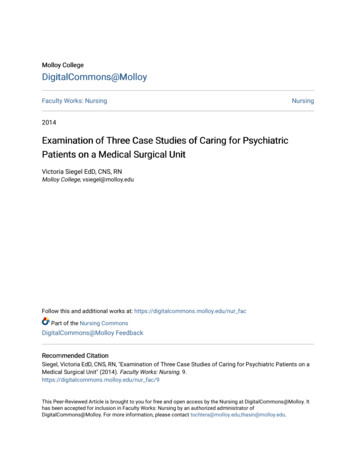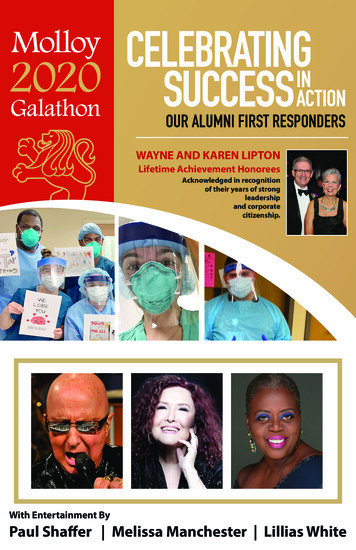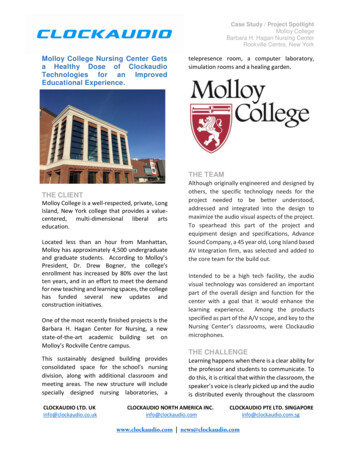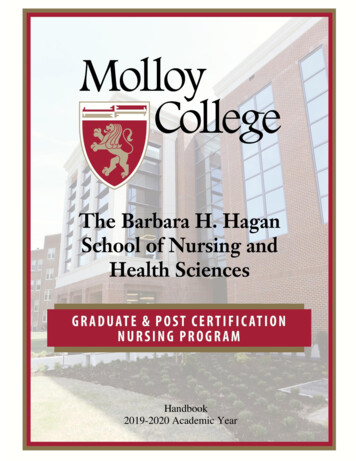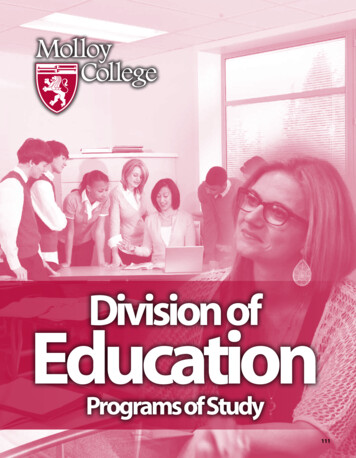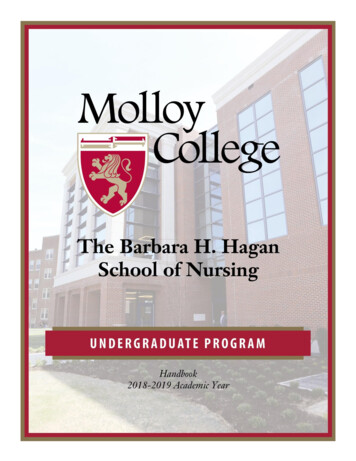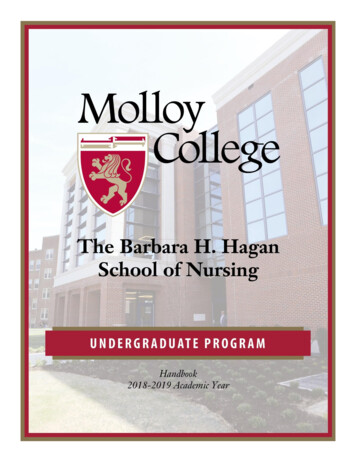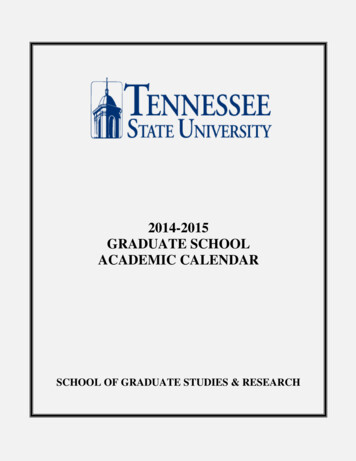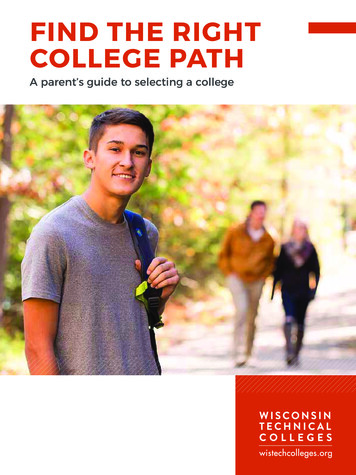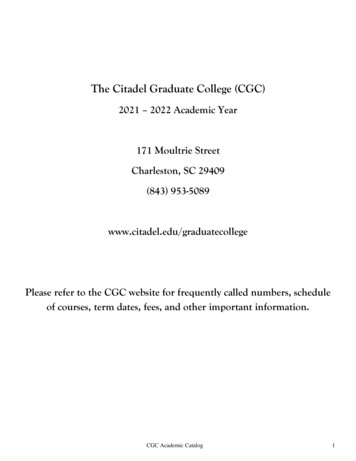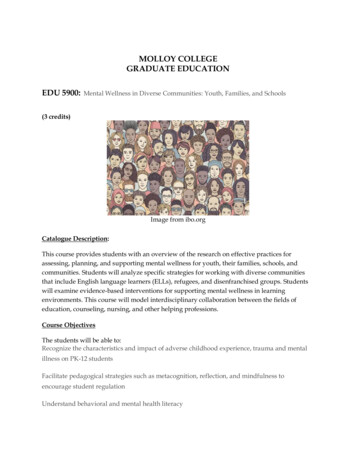
Transcription
MOLLOY COLLEGEGRADUATE EDUCATIONEDU 5900:Mental Wellness in Diverse Communities: Youth, Families, and Schools(3 credits)Image from ibo.orgCatalogue Description:This course provides students with an overview of the research on effective practices forassessing, planning, and supporting mental wellness for youth, their families, schools, andcommunities. Students will analyze specific strategies for working with diverse communitiesthat include English language learners (ELLs), refugees, and disenfranchised groups. Studentswill examine evidence-based interventions for supporting mental wellness in learningenvironments. This course will model interdisciplinary collaboration between the fields ofeducation, counseling, nursing, and other helping professions.Course ObjectivesThe students will be able to:Recognize the characteristics and impact of adverse childhood experience, trauma and mentalillness on PK-12 studentsFacilitate pedagogical strategies such as metacognition, reflection, and mindfulness toencourage student regulationUnderstand behavioral and mental health literacy
Carry out interventions to support social, emotional and behavioral wellness across PK-12educational environmentsCollaborate effectively with families, agencies and the community and foster mentorshipmodels for struggling students.Required MaterialsAll required readings will be posted on Canvas.Course Requirements1.2.3.4.5.Capstone Interdisciplinary ProjectCapstone Interdisciplinary PresentationModule assignmentsCanvas discussion boardsClass ********************************************LATE ASSIGNMENTS WILL RESULT IN LOWERING THE GRADE BY 10%.30%20%20%20%10%100%NOTE: Assignments submitted after the due date will lose 10% for each week that it is late.Selected BibliographyCarlson, L. A., & Kees, N. L. (2013). Mental health services in public schools: A preliminarystudy of school counselor perceptions. Professional School Counseling, 16(4), 2156759X150160401.Doll, B., Spies, R., & Champion, A. (2012). Contributions of ecological school mental healthservices to students' academic success. Journal of Educational and PsychologicalConsultation, 22(1-2), 44-61.Fontenelle-Tereshchuk, D. (2021). Mental health and the COVID-19 crisis: The hopes andconcerns for children as schools re-open. Interchange, 52(1), 1-16.Lee, J. (2020). Mental health effects of school closures during COVID-19. The Lancet Child &Adolescent Health, 4(6), 421.
Repie, M. S. (2003). A school mental health issues survey from the perspective of regular and specialeducation participants, school counselors, and school psychologists. George Mason University.Academic Integrity StatementThe college maintains and affirms a strong policy of academic honesty. Every member of theacademic community has a duty neither to cheat nor to condone cheating, fabrication,plagiarism, or facilitation of academic dishonesty. Academic infractions are subject todisciplinary action as described in the Graduate Education catalog.AccommodationsMolloy College makes a commitment to providing reasonable accommodations for any studentwith a documented disability or chronic illness. Like so many things this semester, the need foraccommodations and the process for arranging them, may be altered by COVID-19.Students requiring accommodations in order to fully participate in this class are urged tocontact Disability Support Services (DSS/STEEP) at dss@molloy.edu, as soon as possible.APA Manuscript StyleAll manuscripts in the field of education are written in the style format of the AmericanPsychological Association.Attendance PolicyIn the case of any absence, please email the professor prior to class.As professionals in your field, you are expected to attend each class session, to be present whenit begins, to come prepared for class, and to participate productively in whole-class and smallgroup activities. Professionalism and respect are expected in classroom participation.Professional behavior includes turning off and stowing cellphones, refraining from outsideconversation or activities (including Internet surfing, text messaging, or preparing for otherclasses/activities), and being a thoughtful and active listener.Students are expected to attend classes regularly and punctually. For every absence after thethird absence, your grade will be reduced by one-half letter grade for this class; e.g. a B become a B. Be advised that attendance will be taken at the beginning of each class. Studentswho arrive to class late are responsible for reminding the instructor to change the attendance forabsent (A) to late (L). Three late class arrivals will officially count as one absence indetermining your grade for this class.It is the accepted practice at Molloy College that faculty take attendance in all courses.
Students should notify faculty if an absence is necessary as the result of a serioussituation.Failure to attend class for two (2) consecutive weeks at any point in the semester,without notification of extenuating circumstances, will result in an administrativewithdrawal from the course.In the case of an online or hybrid course, attendance is considered similarly important.Therefore, failure to participate in academic activities in any given week is considered anabsence.o Examples of participation in academic activities representing attendance wouldbe participation in a class chat or discussion board on an academic topic, submission of a required assignment, digital interaction with the professor on an academic topic, and completion of a quiz or exam.Administrative withdrawal results in removal from the course with a grade of “WA” or WF”determined by the point in the term and the academic performance. Students should consult theCollege catalog for complete details regarding withdrawals and the potential financialimplications of a withdrawal.Class ParticipationActive class participation is expected of all . As future participants, it is expected that you willbe interested in the course topics, and that you will share ideas, questions, and observations(from the field, if applicable) in each module. Only those participants who share ideas,comments, and observations in each module and demonstrate their knowledge of the coursereadings and content, will have the possibility of receiving a 9 or 10 for the class participationscore.Communicating Across the Curriculum:Communicating across the curriculum requirements are satisfied by: Module Assignments Interdisciplinary Project Canvas Discussions20%20%15%Diversity StatementThis course will highlight diversity in the following ways: use their knowledge of student diversity to affirm and support full participationand continued study of mathematics/STEM by all students;in nearly all discussions about teaching and learning;adherence to multi-modality lesson design that complies with learning standardsand evidence within the written and presented lesson plan;
demonstration of lessons that are interdisciplinary and subject-specific inaccordance with: lessons, unit plans, and individual presentations, discussionsabout children with special needs, giftedness, and the evaluation procedures fordiverse learners.diversity includes gender, culture, ethnicity, socioeconomic background, language,special needs, and mathematical learning styles.E-mail PolicyIt is mandatory that every candidate have a Molloy College e-mail account and check it daily.Information re: the programs as well as communication from course professors utilize this media.This Molloy e-mail account must be activated immediately. If not utilized within 30 days, theaccount becomes defunct and needs to be reinstated.Information Literacy StatementInformation literacy is a set of abilities requiring individuals to "recognize when information isneeded and have the ability to locate, evaluate, and use effectively the needed information."Information literacy also is increasingly important in the contemporary environment of rapidtechnological change and proliferating information resources. Because of the escalatingcomplexity of this environment, individuals are faced with diverse, abundant informationchoices--in their academic studies, in the workplace, and in their personal lives. Information isavailable through libraries, community resources, special interest organizations, media, and theInternet--and increasingly, information comes to individuals in unfiltered formats, raisingquestions about its authenticity, validity, and reliability. In addition, information is availablethrough multiple media, including graphical, aural, and textual, and these pose new challengesfor individuals in evaluating and understanding it. The uncertain quality and expanding quantityof information pose large challenges for society. The sheer abundance of information will not initself create a more informed citizenry without a complementary cluster of abilities necessary touse information effectively.Information literacy forms the basis for lifelong learning. It is common to all disciplines, to alllearning environments, and to all levels of education. It enables learners to master content andextend their investigations, become more self-directed, and assume greater control over their ownlearning.An information literate individual is able to:Determine the extent of information needed;Access the needed information effectively and efficiently;Evaluate information and its sources critically;Incorporate selected information into one’s knowledge base;Use information effectively to accomplish a specific purpose; andUnderstand the economic, legal, and social issues surrounding the use of information, andaccess and use information ethically and legally.American Library Association (Chicago: American Library Association, 1989).
This course will address Information Literacy in the following ways:RecordingsAs a student enrolled in courses offered by Molloy College, Rockville Centre, New York, Iunderstand that classes may sometimes be audio or digitally captured for instructionalpurposes. THESE RECORDINGS ARE INTENDED ONLY FOR EDUCATIONAL PURPOSESAND WILL BE USED ONLY BY THE FACULTY AND STUDENTS ENROLLED IN THECOURSE. PLEASE NOTIFY YOUR INSTRUCTOR BY EMAIL IF YOU DO NOT CONSENT TOPARTICIPATION IN A DIGITAL RECORDING OF YOUR COURSE.If no student elects to withhold his/her consent prior to , digital recording ofthe class will begin on . Any student who has not contacted the professor prior tothat date will be deemed to have consented to the recording. You may notify your professor byemail at any time if you choose to revoke your consent.Technology StatementThis course will highlight technology in the following ways: use appropriate technology to support the learning of mathematics including, butnot limited to, computers and computer software, smart board, calculators,interactive television, tablets, distance learning, electronic information resources,and a variety of relevant multimediause a variety of print and electronic resourcessubmission of Canvas assignmentThe Respectful ClassroomA major determinant of an effective teacher involves positive dispositions. It is expected thatteacher will recognize and contribute to a mutually respectful classroom, both in word anddeed. All cell phones and other hand-held or electrical devices MUST be turned off prior to thebeginning of each class, put away, and kept off during class. An exception to this rule is if thesedevices are being used as part of the class. Teacher are not to leave class to receive or sendtelephone, text, other messages, or to use other devices.Student Personal Counseling CenterThe Student Personal Counseling Center (SPCC) is a confidential and free service available toall currently enrolled Molloy College students. Through individual counseling, wellnessworkshops, crisis intervention, support groups, and on-campus trainings, the SPCC aims toenhance wellness, and offer students a more meaningful, and successful college experience. Ifyou are interested in scheduling an appointment, please call 516-323-3484 Monday-Friday from9am-5pm. The SPCC is located in Public Square 030.
Zoom in the ClassroomZoom is a video conferencing tool where instructors and students can meet online at the sametime to interact in academic activities such as classroom lectures, student presentations, screensharing and discussions. Zoom is often utilized with online synchronous courses at Molloy.Minimizing Distractions During Synchronous Online ClassZoom, or conferencing sessions, can be impacted by many different environmental orsituational variables. Here are some strategies and suggestions for minimizing such impact: Students should mute their microphone when they are not speaking. Consider using virtual backgrounds, which display the participant but mask thearea behind them. Students should not watch videos, listen to music, or use other applications (other thannote taking apps) while attending class. Doing so could not only distract the class butlead to a degradation in computer performance that may affect the student viewerexperience. Student can use the chat feature in Zoom to communicate with the entire class and orthe instructor but should not be participating in one-to-one chats with their peers duringclass.Student Reminders and Etiquette Just as in an on-campus classroom, it is important to make the best virtual impressionduring a Zoom meeting. You may be viewable, or heard, by the entire class during a Zoom session and shouldconduct yourself accordingly. Classes may be recorded by the Instructor (see the Recordings section of this courseoutline for further information). Student recordings are only permitted if all participants are fully informed that therecording will take place and all participants consent to being recorded. Please refer tothe Molloy Student Handbook for more details. Dress as if you are in a classroom setting. Students are expected to uphold Molloy College’s Academic Honor Pledge. Abide by the Civility Policy found in the Molloy Student Handbook.Covid-Related ProtocolsMolloy College has a continuing commitment to providing reasonable accommodations for anystudent with a documented disability or chronic illness. Like so many things thissemester, the need for accommodations and the process for arranging them may bealtered by the COVID-19 changes we are experiencing and the safety protocols currentlyin place. Students who may need accommodations in order to fully participate in thisclass are urged to contact Disability Support Services (DSS/STEEP) at dss@molloy.edu,as soon as possible.Disinfecting Protocol
All members of the Molloy Community are expected to contribute to a healthy environment.Therefore, disinfectants, or chemicals that kill germs on surfaces, will be available in allinstructional spaces. Upon arrival in an instructional space, please take a disinfectant wipe,wipe down the desktop and any hard surfaces in your area (keyboard, mouse, etc.). At theconclusion of your time in that space please repeat the process, wiping down surfaces with afresh wipe. Wipes should be properly disposed in the room receptacle.Vaccinations and Face CoveringAll students are required to be vaccinated or have an approved exemption or accommodation.All individuals who are exempt from a COVID-19 vaccinations must wear face coverings. If youare required to wear a face covering it must cover both the nose and mouth must be worn at allMolloy locations while indoors. PLEASE NOTE: The general face covering policy may changethroughout the semester as determined by the evolving nature of the pandemic.AccommodationsStudents seeking COVID 19 related accommodations should contact the Center for Access andDisability at access@molloy.edu.
education, counseling, nursing, and other helping professions. Course Objectives The students will be able to: . support groups, and on-campus trainings, the SPCC aims to enhance wellness, and offer students a more meaningful, and successful college experience. If you are interested in scheduling an appointment, please call 516-323-3484 .
